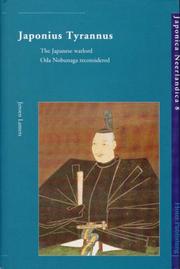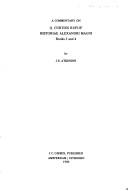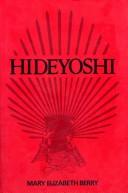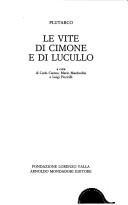| Listing 1 - 10 of 461 | << page >> |
Sort by
|

ISBN: 9789004289253 9789074822220 Year: 2000 Publisher: Leiden;Boston Brill | Hotei
Abstract | Keywords | Export | Availability | Bookmark
 Loading...
Loading...Choose an application
- Reference Manager
- EndNote
- RefWorks (Direct export to RefWorks)
Oda Nobunaga (1534-82) is one of the best-known figures in Japanese history. However, no standard biography existed on this warlord who was the prime mover behind Japan's military and political unification in the late 16th century. Japonius Tyrannus fills the gap in our knowledge about Nobunaga, and the chronological narrative providesa thorough analysis of his political and military career.

ISBN: 9004663797 9070265613 Year: 1980 Publisher: Leiden ; Boston : Brill,
Abstract | Keywords | Export | Availability | Bookmark
 Loading...
Loading...Choose an application
- Reference Manager
- EndNote
- RefWorks (Direct export to RefWorks)
Atkinson, J.E. A Commentary on Q. Curtius Rufus’ Historiae Alexandri Magni. Books 3 and 4. 1980 Curtius Rufus' Historiae Alexandri is one of the major sources for the record of Alexan-der the Great as military commander, empire builder, administrator and political boss. This commentary covers the first two extant books, which include the battles of Issus and Gaugamela, the sieges of Tyre and Gaza, Alexander's invasion of Egypt and his visit to the oracle at Siwah. This is primarily an historical commentary, but also offers interrelated analyses of Curtius' literary style and sources. LSCP 4 (1980), 501 p. - 65.00 EURO, ISBN: 9070265613
Book
ISBN: 9787506554237 7506554232 Year: 2007 Publisher: 北京 解放军出版社
Abstract | Keywords | Export | Availability | Bookmark
 Loading...
Loading...Choose an application
- Reference Manager
- EndNote
- RefWorks (Direct export to RefWorks)

ISBN: 9781684172849 9780674390263 Year: 1982 Publisher: Boston Leiden;Boston Harvard University Asia Center BRILL
Abstract | Keywords | Export | Availability | Bookmark
 Loading...
Loading...Choose an application
- Reference Manager
- EndNote
- RefWorks (Direct export to RefWorks)
Book
Year: 1957 Publisher: [Colorado Springs, Colo.] : US Air Force Academy Library,
Abstract | Keywords | Export | Availability | Bookmark
 Loading...
Loading...Choose an application
- Reference Manager
- EndNote
- RefWorks (Direct export to RefWorks)
Book
Abstract | Keywords | Export | Availability | Bookmark
 Loading...
Loading...Choose an application
- Reference Manager
- EndNote
- RefWorks (Direct export to RefWorks)
eebo-0055
Book
Year: 1976 Publisher: 香港 廣角鏡出版社
Abstract | Keywords | Export | Availability | Bookmark
 Loading...
Loading...Choose an application
- Reference Manager
- EndNote
- RefWorks (Direct export to RefWorks)

ISBN: 8804336714 9788804336716 Year: 1990 Publisher: Milano: Mondadori,
Abstract | Keywords | Export | Availability | Bookmark
 Loading...
Loading...Choose an application
- Reference Manager
- EndNote
- RefWorks (Direct export to RefWorks)
Generals --- Generals - Greece - Athens - Biography --- Generals - Rome - Biography
Book
Year: 2000 Publisher: [Place of publication not identified] Clueb
Abstract | Keywords | Export | Availability | Bookmark
 Loading...
Loading...Choose an application
- Reference Manager
- EndNote
- RefWorks (Direct export to RefWorks)
Book
ISBN: 9780393292824 0393292827 0393292835 0393355527 Year: 2017 Publisher: New York W. W. Norton & Company
Abstract | Keywords | Export | Availability | Bookmark
 Loading...
Loading...Choose an application
- Reference Manager
- EndNote
- RefWorks (Direct export to RefWorks)
"An outstanding new edition of Plutarch, the inventor of biography, focused on five lives that remade the Roman world. Pompey, Caesar, Cicero, Brutus, Antony: the names still resonate across thousands of years. Major figures in the civil wars that brutally ended the Roman republic, they haunt us with questions of character and authority: how to safeguard a republic from the flaws of its leaders. Plutarch's rich, vivid profiles show character shaping history through grand scale events and intimate details. The creator and master of the biographical form, Plutarch brilliantly locates character in small gestures such as the selfless Brutus's punctilious use of money, or Caesar's embrace of the plainspoken discourse of the soldier rather than the eloquence of Cicero. This is a true reader's edition of Plutarch. The translation lends a straightforward clarity to Plutarch's prose, and the notes helpfully identify people, places, and events named in the text. The substantial introduction and foreword explore both Plutarch himself as a historical figure and the basic history of the republic's fall."--Provided by publisher.
| Listing 1 - 10 of 461 | << page >> |
Sort by
|

 Search
Search Feedback
Feedback About UniCat
About UniCat  Help
Help News
News